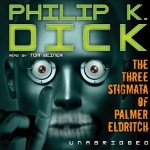|
THE
ENDGAME is a meticulously researched account
of the Iraq war and its aftermath, taken from all angles:
political, social, and military. At 800 pages in print or
32 hours on audio, it's also an in-depth chronicle of every
battle, both major and on the back streets, as well as in
the minds of those who participated. If you're wanting to
understand the hows and whys of the war from 2003 until
today, this is the book. Narrated by Rob Shapiro,
it reveals what we didn't know and should have, the blunders,
the insanity, and the motives and thoughts of those on the
ground, including interviews with principals from all sides.
Luckily for listeners, Shapiro's pleasant voice and crisp
diction make the experience no feat of endurance. |
|
 |
Author Philip K. Dick was an imaginative
seer who enjoyed playing with alternate realities and perceptions.
In his SF novel THE
THREE STIGMATA OF PALMER ELDRITCH he explores
the subjective nature of reality. In this future age the
Earth is hot, but escape to the colonies is not a pleasant
alternative, although you could be drafted to go there against
your will, in which case you may want to hire someone to
help you fool the required psych exam (including, for one
enterprising resister, the acquisition of epilepsy). As
in another of Dick's stories, made into the Tom Cruise movie
"Minority Report," pre-cogs exist who can see
the future, or at least the possible derivations. However,
here most are not cops, but "pre-fash" cogs, meaning
they can anticipate what will become fashionable. Enter
Palmer Eldritch, who has returned from deep space with a
new designer drug that he claims can open one's eyes to
the ultimate mysteries, if not immortality itself. Except
then we learn that Eldritch is dead. Or is he? Everything
is not spelled out here, even in Dick's typically muscular
prose, all of which gives the reader a disconcerting yet
oddly satisfying sense of the miraculous. Remember the director's
cut ending of "Blade Runner," (based on another
Dick story), where Harrison Ford's eyes seem to glow in
the dark for a second, causing speculation among viewers
as to whether he too was an artificial human? Sometimes
it's good to leave a few question marks lying around. This
new recording of The Three Stigmata is
by actor and voiceover talent Tom Weiner, whose delivery
embraces the ethereal nature of the text while evincing
yet another sign (or rather stigmata) that Dick still lives
in the imaginations of readers. |
|
 |
Next, here's a couple oldie-goldies. First or early novels
are sometimes the best which writers produce in their careers
because it takes a dazzler to break into the market. After
all, you have no audience yet, and so publishers are taking
a huge risk with you. Meaning they must be truly impressed.
Such was the case with Brian Haig's "Secret Sanction,"
and even John Grisham's "The Firm." In DERAILED
James Siegel's breakthrough novel, an ad
man named Charles Schine takes a ride with destiny on his
daily train into New York from Long Island. Destiny takes
the form of a beguiler named Lucinda, a fellow commuter
who lures him into a dangerous affair. The title refers
to Schine's life, which is diverted into blackmail and murder,
all the result of his cheating heart. How does this happen?
He is robbed and Lucinda is raped on their first night together,
and the man who did it wants much more. What makes this
story unusual is the way in which it is told. An English
teacher at Attica State Prison asks his incarcerated students
to write about why they're in prison, and he is given Schine's
story. You begin to see why Schine is there, after that
part of the story emerges, revealing that a hit man was
hired by Schine, and that hit man was killed instead. There's
more, but I can't reveal what here. Suffice it to say that
affairs of the heart can be dangerous in more ways than
one, and that self deception is the most dangerous of all.
Actor Gregory Harrison
does a superb job reading this engrossing thriller, nailing
Schine's inner fears and ultimate emergence from cowardice,
as well as the antagonist's chilling playfulness with his
victim. Never over the top, Harrison unerringly interprets
the tone as the story unfolds, and is equally at ease with
female characters, and also with occasional Hispanic accents
and street lingo. Twists are many, and pacing is tight,
so you will not be bored here, despite two easy outs taken
by the plot at critical moments--one involving a gun's safety,
and the other a bizarre unrelated explosion. My theory as
to why these novels seem to work better than many police
dramas or procedurals? Victims stories are more interesting,
as the possibility that we may be victims ourselves is somewhat
greater than that we may be cops. And, of course, a new
viewpoint is always better than the same old thing. |
|
|
While sampling dozens of possibilities, you sometimes stumble
upon a gem. This being my first hearing of author
Rick Riordan, I was pleasantly surprised to discover
a literate and original writer possessing depth, wit, instinct,
pacing, and a knack for capturing character. In THE
DEVIL WENT DOWN TO AUSTIN Riordan displays
the kind of gifts one wishes more well known writers approached,
while the only thing he lacks are clichés. And who
needs them? Like James Lee Burke or Les Standiford, Riordan
creates his own clichés, and uses them only once.
Here is a mystery about a teacher who is rooming with his
brother for the summer when the brother's business partner
is murdered. The business is computer software, and Tres
Navarre has his hands full sorting out the killer while
watching out for his sibling, who is in a wheelchair. There
is a murky lake holding secrets from the past, and the images
of being trapped amid the old sunken trees there below are
drawn so well that the effect is lasting and real. The aftermath
is just as profound.
We lay like that, the fan at the top of the dome pinwheeling
shadows across the ceiling. I thought about dark green water
through the branches of frozen pecan trees. She kissed my
neck. "Stop, okay?"
"What?"
"Thinking."
That's the best thing about this novel--the thoughtful
atmosphere it exudes. . . the local color, the original
observations, and the succinct descriptions, all told with
aplomb by narrator Tom Stechschulte, who
is just as believable as two other veteran mystery readers,
Ron McLarty and Richard Ferrone. One never gets the impression
that Stechschulte is doing anything but telling his own
first-person story, and his acting talent is equally at
ease with a gruff curmudgeon, a haughty matriarch, and a
snide boss. It's not easy to write a novel like this, or
to tell it, which makes the naturalness of it all a joy
to hear. Totally believable, and not to be missed.
|
|